Words MAXMILIAN WECHSLER
| IN an interview at the Libyan Embassy offices at Galaxy Place Tower on Nonsee Road, Charge d’Affaires Mohamed A. Zenati admitted that trying to promote a positive image of his country isn’t always easy. “A lot of negative things have been reported, especially in the Western media, like the boatloads of people from Libya trying to reach Europe. First, I must stress that Libya has a long and noble history. The region has been settled for many thousands of years. In the 7th century BC Phoenicians established trading posts in western Libya and early inhabitants had close contacts with the ancient Egyptians. The Greeks established city states in the eastern part of the country and later Libya became part of the Roman Empire. “And despite some highly publicized tumultuous events in recent years, there are a lot of good things happening now in the country. Unfortunately, they are hardly ever reported. I have noticed that the Thai media doesn’t print much news about Libya and in general Thai people don’t know much about my country. Therefore, I would like to use this opportunity to tell readers of The BigChilli what is really going on. I want to tell them that there are many ongoing projects designed to rebuild the country,” said Mr Zenati, adding that he is on a mission to bring Thai workers and the Thai embassy back to Libya. |
|
Background
Mr Zenati was born in Tripoli in 1958 and studied Economics and Science at the University of Libya. He joined the Ministry of Foreign Affairs (MFA) in 1981 and started out as an attaché. In his long career he has held many important positions in Libya and abroad. He was promoted to the rank of ambassador five years ago but due to political considerations his position in Thailand is that of charge d’affaires and head of mission. He took his post in February 2015. His term is four years. “I visited Thailand for the first time in 2013 to attend a conference in Hua Hin. I was director-general for Asia and Australia and head of the Libyan delegation. I was delighted when I was later appointed to serve here. Thailand is a very nice place. I like the country and I like the people. The food is delicious and foreigners are treated very well. I like the way Thai people are always smiling. I have already visited many places outside Bangkok, including Chiang Rai, Chiang Mai, Koh Chang, Koh Samet, Kanchanaburi, Samut Sakhon, Phuket, Samut Songkhram and Krabi.” Like many foreigners, he finds Thai a difficult language to learn. “I can speak Portuguese, Malay, English and a little Turkish. I have always liked to learn languages and I found it easy, especially when I was younger, but Thai language doesn’t come easy for me.” |
CV of Mohamed A. Zenati Education July 1981: Bachelor of Economics. Work Experience 1981-1987: Attached to the Ministry of Foreign Affairs. 1987-1991: Third Secretary at Libyan embassy in Lisbon, Portugal. 1992-1998: Second Secretary and Assistant Head of Division at European Department. 1998-2002: First Secretary at Libyan embassy in Jakarta, Indonesia. 2002-2004: Counselor, Head of Division at Asian Department. 2004-2007: Counselor, Head of Division at Cooperation Department. 2007-2012: Counselor and Charge d’ Affaires, Libyan embassy in Ankara, Turkey. 2013-2015: Ambassador and Director-General of Asia and Australia Department. 2015 until present: Ambassador Charge d’ Affaires of Libyan embassy in Bangkok. Meetings and conferences Participated in numerous official meetings, regional and international conferences all over the world, including: 2006: African-Chinese Forum in Beijing, China. 2009: Turkish-Africa Forum in Istanbul, Turkey. 2013: Thai-Africa dialogue, Hua Hin, Thailand. 2013: Japanese-African Development conference in Tokyo. 2013: 68th Session of the General Assembly of the United Nations in New York. |
| Bilateral relations “Libya and Thailand established diplomatic relations in 1977. In the past there have been a number of official visits exchanges and our countries have a history of consulting and coordinating on regional and international issues of mutual interest. A Royal Thai embassy was opened in Tripoli in 2009. There was a Thai ambassador in residence there from 2010 until 2014. Unfortunately, in that year the security situation in Libya became so bad that many embassies packed up and went home, including the Thai embassy. So now there is no Thai embassy in Libya, but we are looking forward to reopening it in the near future. We are also hoping that Thai companies and workers will soon come back to Libya,” Mr Zenati said. “The Libyan embassy in Bangkok started operation in 2014 and we have been in this building since May 2016. We are happy here. The location is good and convenient. There are six Libyan officials working here and four Thai staff. The Thai MFA and other authorities have welcomed us with open arms. “We have a growing exchange of trade between our two countries. You will find many Thai products on the market in Libya, like car spare parts and accessories, beauty products like cosmetics, clothes, kitchenware, rubber products, paper, refrigerators, washing and drying machines, prepared and preserved fish, rice, precious stones and jewelry. “Many Thai workers are coming to Libya and Libyans are doing business in Thailand. Some have import-export offices here. Some Libyan clothes traders have been in Thailand for 50 years. One such company has an office in the Pratunam area. Libyan businessmen have long been coming to Thailand for trade and investment purposes. Some reside here and are married to Thai women and some are doing joint ventures with Thai partners. “As I have said, until recently there were a large number of Thai companies and workers in Libya. I am working with the Thai MFA to bring them back, along with the Thai embassy. Before the revolution, 15,000 to 20,000 Thai workers were employed in Libya by foreign companies. They were employed in infrastructure and construction jobs and in the oil, health and other sectors. The skills of Thai workers are needed to help in the restoration of Libya. | “My country has suffered a lot due to the political unrest and now we are rebuilding what was destroyed. There are a lot of new projects going on in infrastructure, construction, communications, transportation, oil and other fields. We hope that Thais will come very soon to participate in the re-construction. In the past experts and investors from Thailand were involved in several big projects in Libya. We hope that Thai investors and business people will see the potential in developing their portfolios in Libya during this crucial time. “It is my duty to explain to the Thai government that the situation in Libya is much improved and it is safe to return. Our embassy in Bangkok is always willing to answer any questions from the Thai government and business community.” |
Feeling the way to freedom
The situation in 2014 was very bad, but we have progressed quickly. We started from zero. After the revolution in 2011, it was the first time Libya had tasted democracy and freedom. We didn’t have any experiences to prepare us for that.
“We tried to convince people that we must have political parties, and also that we must respect each other and respect others’ opinions. The Libyan Government of National Accord (GNA) was formed as a result of the Libyan Political Agreement which was backed by the United Nations and signed on December 17, 2015. Fayez Mustafa al-Sarraj was appointed Prime Minister. A UN special envoy came to Libya and helped us to work out a road map to full democracy. The UN is committed to helping us prepare for presidential and parliamentary elections by the end of 2018. Delegations from many countries are currently visiting Libya and helping the government by holding meetings, training our police and so on.
“After the revolution there was a split in the army. Many factions were formed and war weapons became widespread. Now we are starting to dissolve the militias and collecting weapons. We are taking this and other important steps with assistance from the international community. We hope that after the election Libya will have stability and peace, and become a prime destination for companies and tourists. Libya is a rich country in many respects and we have a lot to offer the world.”
The situation in 2014 was very bad, but we have progressed quickly. We started from zero. After the revolution in 2011, it was the first time Libya had tasted democracy and freedom. We didn’t have any experiences to prepare us for that.
“We tried to convince people that we must have political parties, and also that we must respect each other and respect others’ opinions. The Libyan Government of National Accord (GNA) was formed as a result of the Libyan Political Agreement which was backed by the United Nations and signed on December 17, 2015. Fayez Mustafa al-Sarraj was appointed Prime Minister. A UN special envoy came to Libya and helped us to work out a road map to full democracy. The UN is committed to helping us prepare for presidential and parliamentary elections by the end of 2018. Delegations from many countries are currently visiting Libya and helping the government by holding meetings, training our police and so on.
“After the revolution there was a split in the army. Many factions were formed and war weapons became widespread. Now we are starting to dissolve the militias and collecting weapons. We are taking this and other important steps with assistance from the international community. We hope that after the election Libya will have stability and peace, and become a prime destination for companies and tourists. Libya is a rich country in many respects and we have a lot to offer the world.”
| Economy back on track “Since 2016 the economic situation in Libya has begun to improve. Economic growth depends on political stability. The economy suffered greatly in the years of internal tensions, we had economic recession and rising unemployment. Big projects were stopped. Many countries were investing in Libya, but that all came to an end as things deteriorated. The political agreement reached to establish the GNA was an important step in stabilising the general situation, as was termination of terrorist groups in Sirte and Benghazi. The GNA is the legitimate government and is recognised by the international community. The government has worked hard to improve the security situation, create stability in the country and resume the export of oil. Exports are now at around one million barrels per day and production will keep increasing in the future. “Many countries haves re-opened their embassies in Tripoli and international companies have returned as well. Projects are being resumed and new ones are being started. We signed a contract last month with an Italian company worth US$100 million for reconstruction of the international airport in Tripoli. The project is planned to be finished within 18 months. “Libya has an African investment portfolio valued at US$6 billion that includes various business sectors on the continent including hotels, mining, timber, agriculture, fisheries, manufacturing and petroleum. The Libyan African Investment portfolio has hotels in 12 African countries. We also invested in the telecommunications sector. We have supported 60% of projects of the African satellite program. We also own 1,250 gas and petrol stations in 22 African countries. | “At the moment, Libya’s estimated reserves of crude oil are from 48 billion barrels to 74 billion barrels. This means we have the capacity to export crude oil for many years in the future. Libya’s estimated gas reserves are from 55 trillion cubic feet to 177 trillion cubic feet. Our huge oil and gas reserves give us a tremendous economic advantage in the long term. “Under the supervision of the National Oil Corporation (NOC), the financial situation in the oil and gas sector has improved in 2017, especially as far as exports. It is important to say here that we are seeing the normalisation of the security situation in Libya. This means that oil and gas companies have begun to conduct business as usual. In December 2017 crude oil exports were about 1.1 million barrels per day. Mr Zenati said the NOC’s business plan is to develop oil production in three phases. Phase 1: Increase capacity to 1.32 million barrels per day within a year. This will require an investment of US$500 million. Phase 2: Increase oil production capacity up to 1.5 million barrels per day by the end of 2018. Moreover, the plan is to implement oil field projects and pipelines in order to achieve more efficiency and effectiveness. Investment: US$1.2 billion. Phase 3: The NOC aims to increase oil production capacity up to 2.2 million barrels per day at the beginning of 2023. Investment: US$18 billion. “The Libya Investment Authority has so far invested US$196.7 billion in foreign banks and stock exchanges. In 2016 the Authority saw a profit of US$219 million from interest on deposits and US$112 million from stocks.” |
| Illegal migration “An important topic I want to discuss is illegal migration. Libya is a destination and transit country for millions of illegals. Most are from Africa but many come from Asian countries such as Bangladesh and Pakistan as well as Arab countries. We have a history of treating migrants very well. We have shared with them our lives, bread and butter – everything. But now there is a huge influx of people, mostly young Africans, who hope to travel by ship to Europe. It’s estimated there are now 500,000 to 700,000 illegals in Libya. They work for a while, save some money and then buy passage on boats operated by traffickers and depart for Europe. The situation is placing a big burden on Libya. Libya is very large country and the border along the desert in the south of the country is easy to cross. “With all our other problems, we don’t have the capacity to control our borders. We need cooperation from other countries. Libya is trying to help some of those unfortunate people. The boats are arranged by gangs and networks that are not only from Libya but also from other African countries and Europe. They coordinate together and make money from people’s suffering. “We are very concerned about recent media reports, mainly from CNN, that say there is slavery in Libya and imply that the government is turning a blind eye. This is very disgusting and it’s not true. Our government condemns all such alleged acts which completely contradict our religion, our values and Islamic culture. We have launched a very comprehensive investigation into this issue and if anyone is found guilty they will face justice. After the investigation is completed, we will show the media the truth. What we can say is that some criminal gangs in Libya are involved. Actually it happens in many countries. The illegal migrants have chosen Libya because it is close to Europe and they hope to find work there. They are coming from countries with a lot of poverty. We are asking the international community, especially in Europe, to cooperate with us to solve the problem because this is the most likely destination for the illegal migrants. | “Mass migration is a global phenomenon. We have to cooperate in order to resolve this problem from the roots. We have made a proposal and even delivered a statement in 2006 during an Africa-Europe summit held in Tripoli to the effect that there is a great need to establish development projects in African countries so people can have jobs and live well in their home countries so that they don’t have to immigrate anymore abroad. “The situation in Libya is unsustainable. We cannot afford to have so many migrants in our country. They need shelter and food and in our present situation we need to take care of our people first. We are trying to coordinate with Italy and Germany to arrange ways for the migrants to get to Europe without having to go through traffickers. We are talking with neighboring African countries and asking them to accept their nationals back. “We are very concerned about the media reports. The government has issued statements about the slavery claims made by CNN and I have spoken about them to the Thai press. I have written a statement and talked to the Thai MFA to explain our position. “Libyans are very simple and decent people. In Libya there’s no such thing as slavery. We think that what happened is that CNN filmed some people negotiating prices for boat trips. The Niger embassy in Libya has also said that nothing like slavery is happening to their people in Libya. It is very important for us to maintain good relations with other African countries. Libya is one of the most important countries in Africa. As I have said, we invest in other African countries and many of their citizens work in Libya legally. “Libya is one of the founders of the African Union and through that organisation we promote peace, prosperity and an integrated Africa. We encourage investment and promote rural, social and gender development,” said Mr Zenati, adding that Libya is also a member of the Arab League, Organization of Islamic Cooperation and the UN. |
|
Libya factsheet
Libya is an Arab Muslim country situated in North Africa with a 2,000km coastline on the Mediterranean Sea in the north. It borders Egypt on the east and Tunis and Algeria on the west. Niger, Chad and Sudan border the country on the south. Like a lot of African countries, Libya has been occupied by many foreign nations. The population of Libya is about 6.65 million, almost 100 percent of them Sunni Muslims. Libya is a very large county occupying about 1.76 million square km that include large desert and coastal areas. The biggest cities are Tripoli (capital), with a population of about 2.2 million; Benghazi with about 1.1million people; and Misurata which has about 500,000 residents. In ancient times the Phoenicians established trading posts in western Libya and the Greeks established city states in the eastern part of the country. Later Libya became a part of Roman Empire. The Spanish and the Knights of John occupied Tripoli in the 16th century, until Ottoman rule began in 1551. Libya was part of the Ottoman Empire for four centuries (1551-1911). In 1911 Libya was occupied and colonized by Italy until the end of the Second World War in 1945. After the victory of allied forces Libya was put under the administration of Britain from 1943-1951. On December 24, 1951 Libya gained complete independence and declared itself a monarchy named the United Kingdom of Libya, with King Idriss Alsanussi as Head of State and a constitutional parliamentary system. |
In 1963 some foreign companies made the important discovery of petroleum in Libya, leading to economic growth and many development projects throughout the country. This greatly improved the lives of Libyan citizens.
In 1969 Muammar Gaddafi, a military officer, seized power and proclaimed the Arab Republic of Libya. Gaddhafi ruled for 42 years until he was toppled in 2011. The revolution that removed him was a part of what became known as the Arab Spring. A general election was held in 2012 and the General National Congress became the first Libyan parliament in decades. The new government faced considerable difficulties in restoring peace and stability to the country. Another general election was held in 2014 and a new parliament and interim government were chosen. Under the sponsorship of the United Nations a deep dialogue between Libyan parties from all over the country was held in Morocco. The parties approved the Skhirat Political Agreement, signed on December 17, 2015. In line with the agreement, the Presidential Council and Government of National Accord were formed and quickly started work in Tripoli to improve the country’s political and security environment |

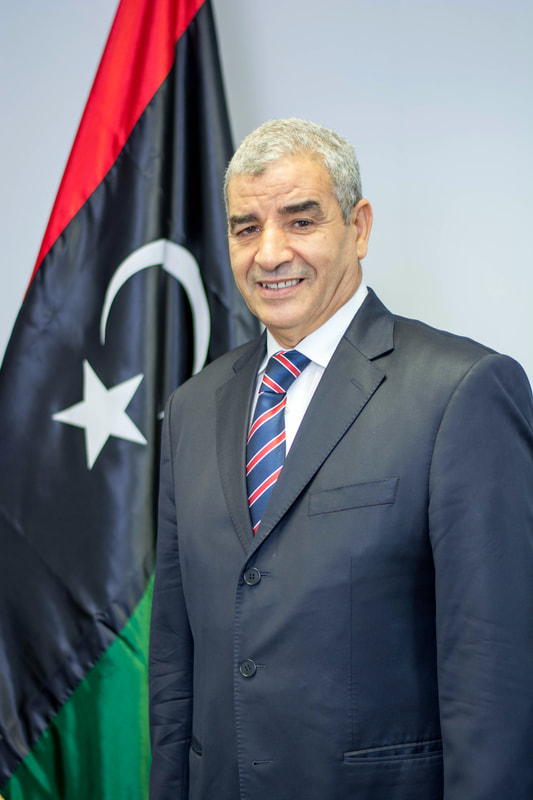
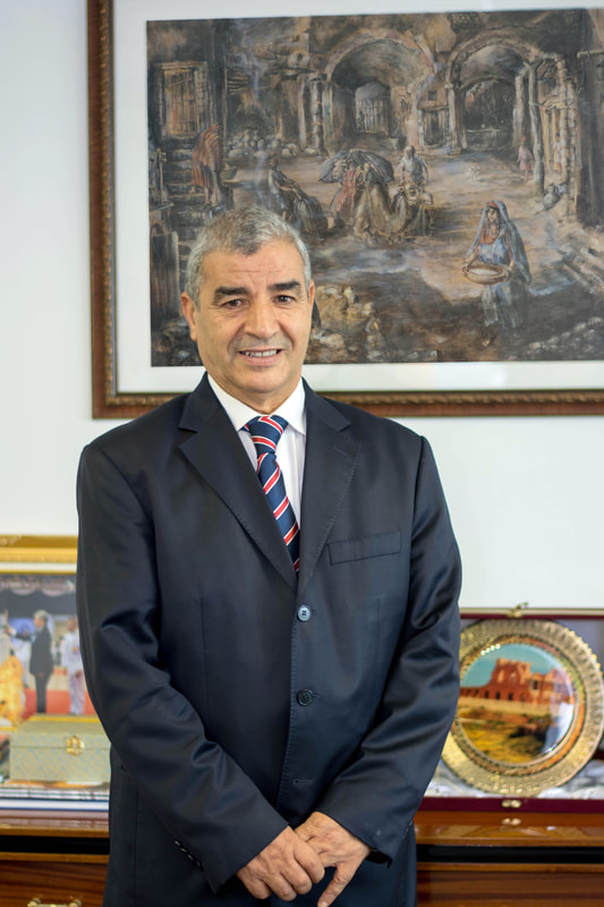
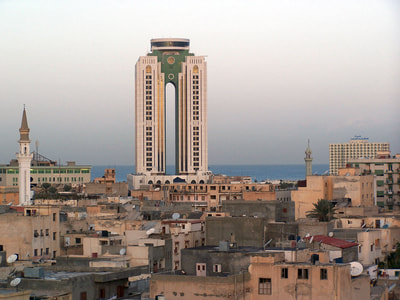
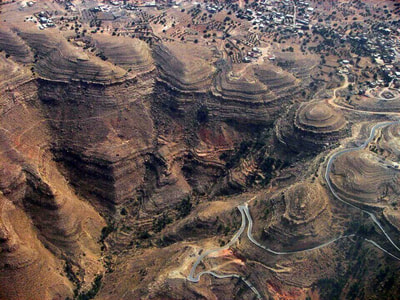
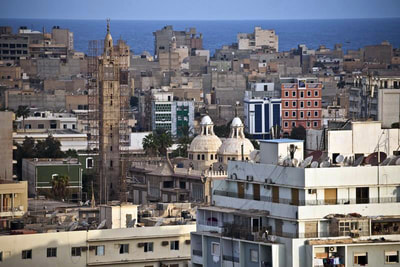
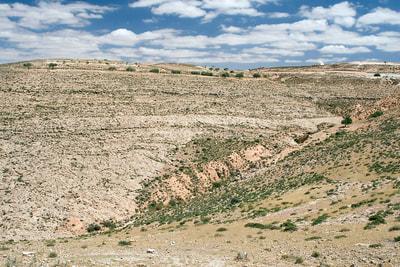
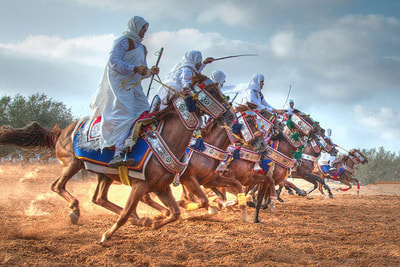
 RSS Feed
RSS Feed
















